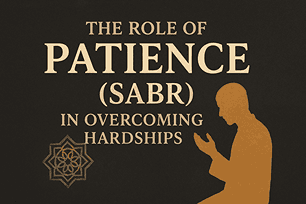Islamic
benefits of sabr, importance of patience in islam, islamic guidance on sabr, islamic perspective on patience, islamic tips for hardships, overcoming challenges with sabr, patience during trials, Patience in Islam, rewards of patience in quran, sabr and resilience, sabr in daily life, sabr in hardships, Zeeshan Azhar
Zeeshan Azhar
0 Comments
The Role of Patience (Sabr) in Overcoming Hardships

Life is full of ups and downs. Every individual, at some point, faces challenges, losses, or trials that test their strength. For Muslims, these moments are not random accidents but part of Allah’s divine plan. In Islam, one of the most powerful tools to face such difficulties is Sabr (patience). It is more than just waiting; it is an active state of perseverance, faith, and self-control that brings both spiritual and worldly benefits.
Understanding the Concept of Sabr
The Arabic word Sabr goes beyond the English meaning of patience. It includes:
- Steadfastness in times of trials
- Self-control during anger, grief, or temptation
- Trust in Allah’s wisdom even when things are unclear
The Qur’an repeatedly emphasizes Sabr as a sign of true faith. Allah (SWT) says:
“Indeed, Allah is with the patient.” (Qur’an 2:153)
This verse reassures believers that patience is not just a virtue but a way to draw closer to Allah.
Why Hardships are a Part of Life
No one is free from trials. Illness, financial struggles, emotional pain, and personal losses are part of the human journey. According to the Qur’an:
“And We will surely test you with something of fear and hunger and a loss of wealth and lives and fruits, but give good tidings to the patient.” (Qur’an 2:155)
Hardships are not punishments but opportunities for growth, purification, and elevation in the sight of Allah.
Types of Sabr in Daily Life
Patience is required in many situations. Scholars usually divide Sabr into three categories:
- Patience in Obedience – Consistently performing prayers, fasting, giving charity, and avoiding laziness.
- Patience in Avoiding Sin – Resisting temptations like dishonesty, backbiting, or forbidden desires.
- Patience During Hardships – Maintaining faith and calm when faced with illness, financial stress, or personal loss.
By practicing all three, a believer strengthens both character and faith.
The Rewards of Patience
The rewards of Sabr are immense. Allah (SWT) promises in the Qur’an:
“Indeed, the patient will be given their reward without account.” (Qur’an 39:10)
This means the reward is limitless and beyond human imagination. Moreover, the Prophet Muhammad (peace be upon him) said:
“No one is given a gift better and more comprehensive than patience.” (Sahih Bukhari, Sahih Muslim)
Thus, patience is not only beneficial for coping but also a gateway to eternal success.
Practical Tips to Develop Sabr
Patience is not always easy, but it can be developed with practice:
- Strengthen your connection with Allah through daily prayers, Qur’an recitation, and duas.
- Control negative emotions by pausing before reacting in anger or despair.
- Remember the temporary nature of hardships—nothing lasts forever except Allah’s mercy.
- Seek support from righteous companions who remind you of faith.
- Focus on gratitude for what you still have instead of what you lost.
Sabr in the Modern World
In today’s fast-paced life, where instant results are expected, the value of patience is often forgotten. People want quick fixes for problems, immediate wealth, and instant relief from pain. However, true strength lies in slowing down, accepting Allah’s decree, and trusting His timing. By practicing Sabr, we gain inner peace, healthier relationships, and a stronger connection to our Creator.
Conclusion
Hardships are inevitable, but how we respond determines our spiritual success. Sabr is not passive waiting—it is active endurance with faith. Through patience, we rise above our struggles, gain Allah’s pleasure, and secure eternal rewards. As believers, let us embrace Sabr as our shield against life’s trials and a key to ultimate success in this world and the Hereafter.
Tag
benefits of sabr importance of patience in islam islamic guidance on sabr islamic perspective on patience islamic tips for hardships overcoming challenges with sabr patience during trials Patience in Islam rewards of patience in quran sabr and resilience sabr in daily life sabr in hardships Zeeshan Azhar













Post Comment